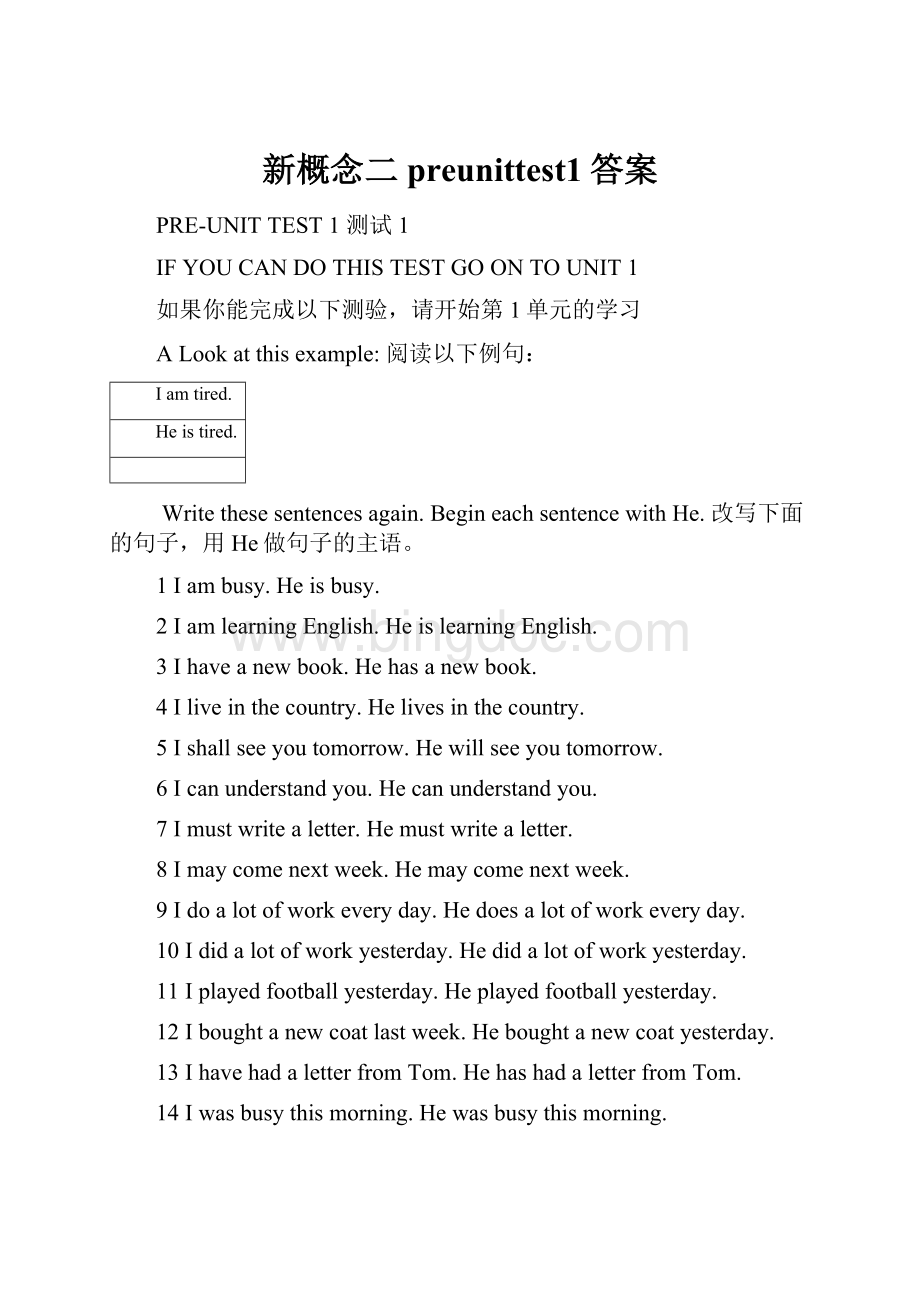新概念二preunittest1答案.docx
《新概念二preunittest1答案.docx》由会员分享,可在线阅读,更多相关《新概念二preunittest1答案.docx(13页珍藏版)》请在冰点文库上搜索。

新概念二preunittest1答案
PRE-UNITTEST1测试1
IFYOUCANDOTHISTESTGOONTOUNIT1
如果你能完成以下测验,请开始第1单元的学习
ALookatthisexample:
阅读以下例句:
Iamtired.
Heistired.
Writethesesentencesagain.BegineachsentencewithHe.改写下面的句子,用He做句子的主语。
1Iambusy.Heisbusy.
2IamlearningEnglish.HeislearningEnglish.
3Ihaveanewbook.Hehasanewbook.
4Iliveinthecountry.Helivesinthecountry.
5Ishallseeyoutomorrow.Hewillseeyoutomorrow.
6Icanunderstandyou.Hecanunderstandyou.
7Imustwritealetter.Hemustwritealetter.
8Imaycomenextweek.Hemaycomenextweek.
9Idoalotofworkeveryday.Hedoesalotofworkeveryday.
10Ididalotofworkyesterday.Hedidalotofworkyesterday.
11Iplayedfootballyesterday.Heplayedfootballyesterday.
12Iboughtanewcoatlastweek.Heboughtanewcoatyesterday.
13IhavehadaletterfromTom.HehashadaletterfromTom.
14Iwasbusythismorning.Hewasbusythismorning.
15IcouldplayfootballverywellwhenIwasyounger.Hecouldplayfootballverywellwhenhewasyounger.
16Ialwaystrytogetupearly.Healwaystriestogetupearly.
17Imightseeyounextweek.Hemightseeyounextweek.
18Ialwaysenjoyagoodfilm.Healwaysenjoysagoodfilm.
19Ihadfinishedmyworkbeforeyoucame.Hehadfinishedhisworkbeforeyoucame.
20Iwatchtelevisioneverynight.Hewatchestelevisioneverynight.
注释:
人称代词he是第3人称单数主格,做句子的主语时后面的谓语动词要作相应改变:
在一般现在时中,动词be要用is;行为动词词尾要加-s或-es;动词have改成has;情态助动词同其他人称一样不需改变;
Heistire.
Helivesinthecity.
Hehasnewbike.
在一般过去时中,he后面的动词be要用过去时形式was:
Hewasbusythismorning.
BLookattheseexamples:
阅读以下例句:
Iwasabiscuit.Iwanttoacupofcoffee.
Iwantsomebiscuits.Iwanttosomecoffee.
DoyouwantanybiscuitsDoyouwantanycoffee
Idon’twantanybiscuits.Idon’twantanycoffee.
Writethesesentencesagain.Putina,someorany.用a,some或any填空。
1Therearesomebooksonthedesk.
2Idrankaglassofbeer.
3Doyouwantanybutter
4Therearen’tanypeopleinthestreet.
5Tomhasjustboughtanewcar.
6Wehavesomeappletreesinourgarden.
7CanIhaveabarofchocolate,please
8Thereisn’tanybreadinthattin.
9Isthereanyinkinthatbottle
10Arethereanyeggsinthatbasket
注解:
some和any是两个常用的数量词,表示不确定的量“一些”。
some用于肯定句中修饰可数或不可数名词:
Iwantsomebiscuits.
Iwantsomecoffee.
any用于疑问句或否定句中修饰可数名词或不可数名词:
Doyouwantanybiscuits
Idon’twantanycoffee.
a作为不定冠词放在单数可数名词前表示不特指的“一个”:
Hehasboughtacar.
CLookattheseexamples:
阅读以下例句:
Ihaven’tanyeggs.Ihaven’tgotmanyeggs.
Hehasn’tanycoffee.Hehasn’tgotmuchcoffee.
Dotheseinthesameway:
模仿例句,改写下面的句子:
1Ihaven’tanybutter.Ihaven’tgotmuchbutter.
2Youhaven’tanycigarettes.Ihaven’tgotmanycigarettes.
3Wehaven’tanymilk.Wehaven’tgotmuchmilk.
4Shehasn’tanybiscuits.Shehasn’tgotmanybiscuits.
5Theyhaven’tanystationery.Theyhaven’tgotmuchstationery.
注释:
many和much都是数量词,表示不确定的量“很多”。
many修饰可数名词;much修饰不可数名词。
DLookatthisexample:
阅读以下例句:
Shegoestotowneveryday.Shewenttotownyesterday.
Dotheseinthesameway:
模仿例句,完成下面的句子:
1Hebuysanewcareveryyear.Heboughtanewcarlastyear.
2Sheairstheroomeveryday.Sheaireditthismorning.
3Heoftenloseshispen.Helosthispenthismorning.
4Healwayslistenstothenews.Helistenedtothenewsyesterday.
5Sheemptiesthisbasketeveryday.Sheemptiedityesterday.
注释:
这几个句子都需要用一般过去时,动词也都要改为动词的过去式形式,因为他们都表示在过去某一时间发生的动作都有表示过去的时间状语,如lastyear、yesterday等。
ELookattheseexamples:
阅读以下例句:
Hewenttothecinemayesterday.
Question:
Didhegotothecinemayesterday
Question:
Wheredidhegoyesterday
Negative:
Hedidn’tgotothecinemayesterday.
Dotheseinthesameway:
模仿例句提问,并做出否定的回答:
1Heboughtanewcar.
Q:
Didhebuyanewcaryesterday
Q:
Whatdidhebuyyesterday
N:
Hedidn’tbuyanewcaryesterday.
2Shecancometomorrow.
Q:
Canshecometomorrow
Q:
Whencanshecome
N:
Shecan’tcometomorrow.
3Theywerehereyesterday.
Q:
Weretheyhereyesterday
Q:
Whenweretheyhere
N:
Theyweren’thereyesterday.
4Hemustleaveearly.
Q:
Mustheleaveearly.
Q:
Whymustheleaveearly
Q:
Heneedn’tleaveearly.
5Hegaveyouapen.
Q:
Didhegiveyouapen
Q:
Whatdidhegiveyou
N:
Hedidn’tgiveyouapen.
6Helivesnextdoor.
Q:
Doeshelivenextdoor
Q:
Wheredoeshelive
N:
Hedoesn’tlivenextdoor.
7Youknowhimwell.
Q:
Doyouknowhimwell
Q:
Howwelldoyouknowhim
N:
Youdon’tknowhimwell.
8Hehasfoundhispen.
Q:
Hashefoundhispen
Q:
Whathashefound
N:
Hehasn’tfoundhispen.
9Yousawthatfilm.
Q:
Didyouseethatfilm
Q:
Whendidyouseethatfilm
N:
Youdidn’tseethatfilm.
10Hearrivedattwoo’clock.
Q:
Didhearriveattwoo’clock
Q:
Whendidhearrive
N:
Hedidn’tarriveattwoo’clock.
FLookatthisexample:
阅读以下例句:
Shesmiled______(pleasant)
Shesmiledpleasantly.
Dotheseinthesameway:
模仿例句,完成下面的句子:
1Hereadthephraseslowly(slow)
2Heworkedlazily(lazy)
3Hecuthimselfbadly(bad)
4Heworkedcarefully(careful)
5Thedooropenedsuddenly(sudden)
注释:
一般形容词的副词形式是在形容词尾加–ly构成。
(也有一些形容词例外。
)副词是用来修饰动词的,一般放在动词后面。
GLookatthisexample:
阅读以下例句:
Itwillraintomorrow.
It’llraintomorrow.
Writethesesentencesagain.Useshortforms.用缩写形式改写下面的句子。
1Hewillarrivetomorrowmorning.
He’llarrivetomorrowmorning.
2Shewillcomethisevening.
She’llcomethisevening.
3Ishallseeyouthedayaftertomorrow.
I’llseeyouthedayaftertomorrow.
4Hewillnotbelieveme.
Hewon’tbelieveme.
5Weshallnotremainhere.
Weshan’tremainhere.
HLookatthisexample:
阅读以下例句:
Thisdressbelongstomysister.Itishers.
Dotheseinthesameway:
模仿例句,完成下面的句子:
1Thesethingsbelongtomyhusband.Theyarehis.
2Thiscoatbelongstome.Itismine.
3Theseshoesbelongtomywife.Theyarehers.
4ThesepensbelongtoTomandBetty.Thepensaretheirs.
5Thissuitcasebelongstoyou.Itisyours.
注释:
以上代词叫所有格代词。
它们指人或指物,单复数形式一样,代替前面句子中提到的名词:
Hisfatherisalawyer.Mineisadoctor.
Theseshoesbelongtomywife.Theyarehers.
ILookattheseexample:
阅读以下例句:
Itiswarmtoday,butitwaswarmeryesterday.
Dotheseinthesameway:
模仿例句,完成下面的句子:
1Itiscooltoday,butitwascooleryesterday.
2Itiswettoday,butitwaswetteryesterday.
3He’slateagaintoday,buthewaslateryesterday.
4Thistestiseasy,butthatoneiseasier.
5Thisbookisexpensive,butthatoneismoreexpensive.
6Thisbookcaseislarge,butthatoneislarger.
7Thatfilmwasinteresting,buttheotheronewasmoreinteresting.
8Bettyispretty,butJaneisprettier.
9MissGreenisbeautiful,butMissWhiteismorebeautiful.
10Tomisintelligent,butBillismoreintelligent.
注释:
形容词的比较级的构成:
单音节和多数双音节的形容词在词尾加-er;以-y结尾的形容词,把y改成i再加-er;以-e结尾的直接加-r;单音节而以一个辅音字母结尾的形容词,要把辅音字母双写后再加-er;多音节的形容词要在词前面用more。
(注意:
有一些形容词的比较级的构成是不规律的。
)
JPutintherightwordorphrase:
yesterday,lastnight,tomorrowetc.
用正确的词或词组填空:
yesterday,lastnight,tomorrow等。
ThedatetodayisMonday,March5th.今天的日期是3月5日,星期一。
1Isawhimyesterday(Sunday,March4th)
2Ishallseehimtomorrow(Tuesday,March6th)
3Ishallseehimtoday.(Monday,March5th)
4Ishallseehimthisafternoon.(Monday,March5th-afternoon)
5Ishallseehimthedayaftertomorrow(Wednesday,March7th)
6Isawhimthebeforeyesterday(Saturday,March3rd)
7Isawhimlastnight(Sunday,March4th-night)
8Ishallseehimtomorrowmorning(Tuesday,March6th–morning)
9Ishallseehimthismorning(Monday,March5th–morning)
10Isawhimyesterdayafternoon(Sunday,March4th–afternoon)
KPutinat,in,oron:
用at,in或on填空:
1Heisgoingtotelephoneatfiveo’clock.在重点前面要用介词at。
2MybirthdayisonMay21st.在具体日期前要用介词on。
3ItisalwayscoldinFebruary.在月份前要用介词in。
4Myfatherwastherein1984.在某年前面要用介词in。
5HeisgoingtoarriveonTuesday.在星期前要用介词on。
LPutinacross,over,between,off,along,in,on,into,outof,orunder:
用across,over,between,off,along,in,on,into,outof或under填空:
1Theaeroplaneisflyingoverthevillage.
2Theshipisgoingunderthebridge.
3Theboyisswimmingacross/intheriver.
4Twocatsarerunningalongthewall.
5Mybooksareontheshelf.
6Thebottleofmilkisintherefrigerator.
7Theboyisjumpingoffthebranch.
8Maryissittingbetweenhermotherandherfather.
9Itis9o’clock.Thechildrenaregoingintoclass.
10Itis4o’clock.Thechildrenarecomingoutofclass。
注释:
over在……上方,经过;under在……地下;across/in如果填across,可译成:
这男孩正在游过/横渡这条河。
如果填in,可译成:
这男孩正在河里游泳;along沿着;on在……顶上;in在……里;off与……离开,脱离;
between在两者之间;into进入;outof出来。
MPutinWhoorWhich:
用Who或Which完成下列句子:
1Whichhatdidyoubuy
2Whobrokethisplate
3Whichbusdidyoucatch
4Whoisknockingatthedoor
5Whichofthetwobooksdoyouwant
NLookattheseexamples:
阅读以下例句:
Sheisthegirl.Shemetmeyesterday.
Sheisthegirlwhometmeyesterday.
Sheisthegirl.Imetheryesterday.
SheisthegirlwhomImetyesterday.
Thisisthebook.Iboughtityesterday.
ThisisthebookwhichIboughtyesterday.
Jointhesesentencesinthesameway.Usewho,whomorwhich.
模仿例句,用who,whom或which连接下面的每组句子。
1Thisisthecar.Themechanicrepairedityesterday.
Thisisthecarwhichthemechanicrepairedyesterday.
2Heistheman.Iinvitedhimtotheparty.
HeisthemanwhomIinvitedtotheparty.
3Thesearethethings.Iboughtthemyesterday.
ThesearethethingswhichIboughtyesterday.
4Heistheman.Hecameherelastweek.
Heisthemanwhocameherelastwe